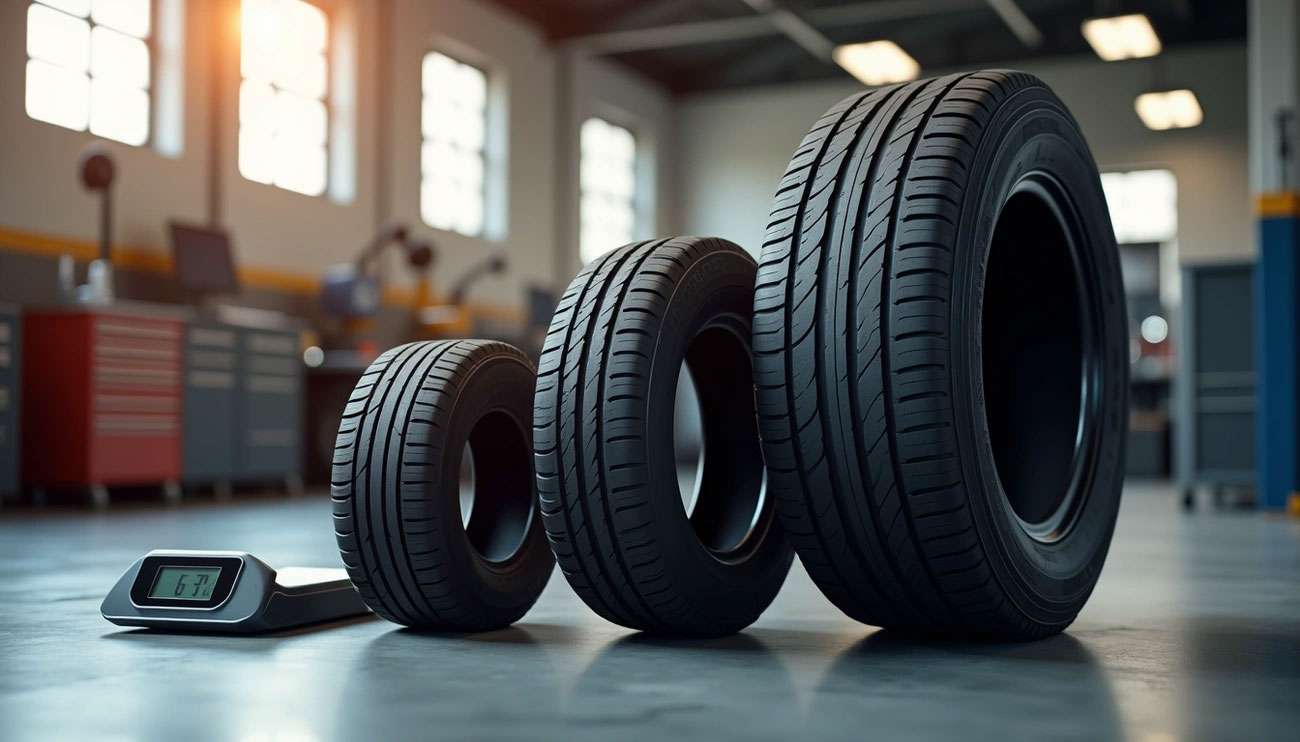
Most drivers never consider how much their car tires actually weigh. The reality? Car tires are much heavier than you might expect. A standard passenger car tire weighs between 20 to 25 pounds, while commercial truck tires can reach 100 to 250 pounds.
Understanding tire weight makes a real difference in your vehicle's performance. The average weight of a car tire has been updated from 20 pounds to 25 pounds based on recent field studies. Passenger car tires typically fall within the 15-25 pound range, but tires for trucks and SUVs are much heavier, weighing between 45 and 100 pounds. At the extreme end, monster truck tires can weigh over 800 pounds!
This guide covers what affects car tire weight, how weight varies across different vehicle types, and why this information matters for your driving experience. Whether you're shopping for new tires or simply curious about your current setup, you'll find the practical insights you need to make informed decisions about your vehicle's performance and efficiency.
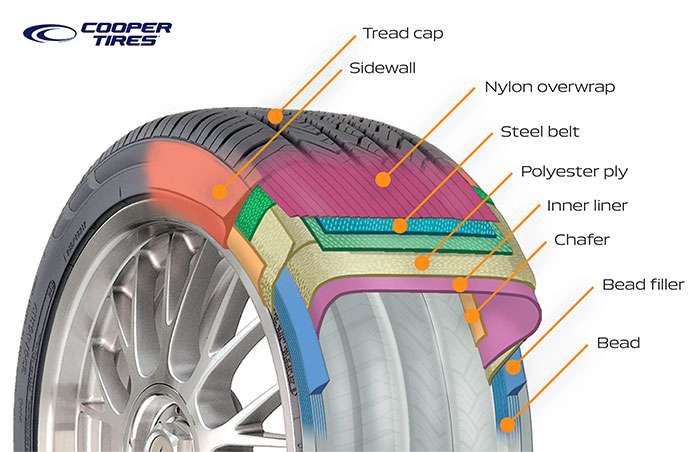
Image Source: https://www.coopertire.com/
The weight of a car tire depends on several key factors. Understanding these elements helps explain why tires from different vehicles can have such dramatic weight differences.
Tire size directly influences overall mass. Larger wheels require larger tires, which weigh more than standard tires. When tire width increases, more material is needed for construction. Wider tires create a larger footprint with more ground contact, adding extra weight. This relationship between size and weight holds true across most tire categories, though manufacturing advances have enabled some larger tires to maintain lighter weights. For example, when comparing 35" tires, a Trail Grappler with 11.5" width weighs 73 lbs, while a KO2 with 12.5" width weighs 64 lbs.
Modern passenger tires contain up to 25 different components and as many as 12 distinct rubber compounds. The typical composition by weight includes approximately 14% natural rubber, 27% synthetic rubber, 28% carbon black, 14-15% steel, and 16-17% fabric and other materials. These proportions vary based on the tire's intended purpose. Rubber compounds differ between tire sections—sidewalls need resistance to scraping and flexing, while treads require exceptional abrasion resistance. All-season tires often weigh less than winter tires due to differences in rubber formulation and design elements.
Tread patterns significantly affect a tire's overall weight. Deeper treads require more rubber material, increasing the tire's mass. The tread alone accounts for 32.6% of the total rubber weight in a standard passenger tire. Tires with aggressive tread patterns—such as those for off-roading—typically use thicker rubber and additional reinforcement, resulting in greater weight. Tread design also influences rolling resistance through hysteresis—the process where energy is lost when a tire flexes upon contact with the road. Some manufacturers are developing tread architecture that maintains grip and durability without excessive weight.
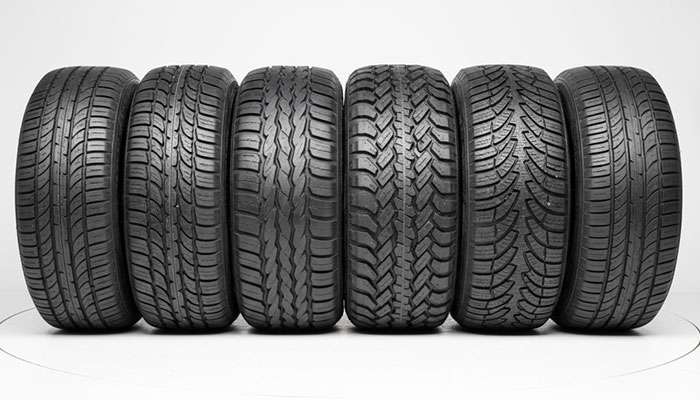
Car tire weights vary dramatically based on vehicle type, intended use, and load requirements. Here's what you can expect across different categories.
Passenger car tires are the most common type on today's roads, weighing between 15 and 25 pounds per tire. Recent updates from the Tire Industry Association increased the average from 20 to 25 pounds after field studies across multiple states. Modern passenger vehicles increasingly use larger tires, though smaller models like 155/70 R13 can weigh as little as 14 pounds.
Trucks, pickups, and SUVs require substantially heavier tires, typically weighing 45 to 100 pounds. The increased weight reflects the enhanced durability and load-carrying capacity these vehicles demand. Light-duty truck tires start around 35 pounds but can reach 80 pounds depending on size and specifications. Pickup truck tires range from 30 to 60 pounds based on construction and intended use.
Motorcycle tires prioritize lightweight construction, ranging from 8 to 30 pounds. European models typically weigh 4 to 9 kilograms (approximately 8.8 to 19.8 pounds). ATV tires show considerable variation—30x9x14 front tires weigh approximately 25 pounds, while 30x11x14 rear tires reach 28 pounds without rims.
Lawn and garden equipment uses extremely lightweight tires. Lawn mower tires typically weigh around 5 pounds, while golf cart tires average 10 pounds. Specialized DOT-approved aftermarket golf cart tires, like the 25x10x12 Streetforce Afterburn, weigh approximately 20 pounds each.
Monster truck tires represent the heaviest automotive tires, weighing 800 to 900 pounds each. Official BKT tires used in Monster Jam events measure 66 inches in diameter by 43 inches wide, with complete wheel and tire combinations weighing 645 pounds. These massive tires operate at remarkably low inflation pressures of just 8 to 10 PSI.
Understanding these weight differences helps explain vehicle performance characteristics. When you're ready to upgrade, find the best selection of car tires at competitive prices at Performance Plus Tire.
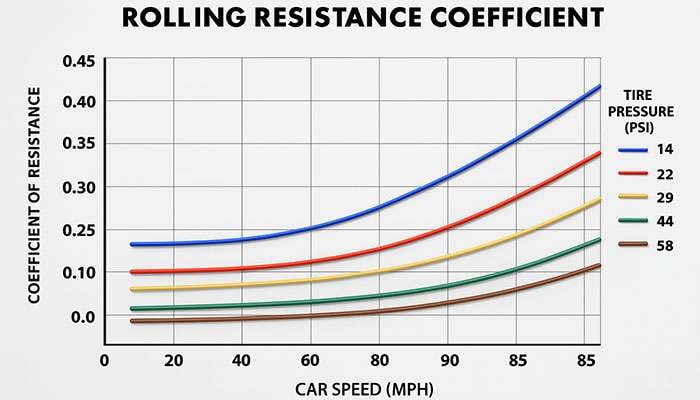
Tire weight directly impacts how your vehicle performs on the road. Beyond adding mass to your car, tire weight affects everything from acceleration to braking distance.
Heavier tires force your engine to work harder. The weight directly impacts your vehicle's fuel consumption, as heavier tires increase rolling resistance and require more energy to maintain speed. City driving amplifies this effect—your engine must repeatedly overcome the inertia of heavier wheels during frequent stops and starts.
Tests demonstrate the real-world impact: reducing wheel weight by 12 lbs per corner improved a vehicle's 0-60 time by 0.29 seconds. The automotive industry estimates that a 10% reduction in tire rolling resistance results in a one to two percent improvement in fuel economy.
Weight creates momentum that your brakes must control. A 10% increase in wheel size results in approximately 10% decrease in brake performance. Similarly, every 10 lbs increase in wheel/tire weight causes about 1% decrease in brake performance.
Lighter wheels provide another advantage—they allow your suspension to react more quickly to road imperfections, maintaining better tire contact with the road surface.
Tire weight affects ride quality through unsprung weight mechanics. When you hit a bump, a 50 lbs wheel experiences 100 lbs of force into your suspension, compared to 60 lbs from a 30 lbs wheel. Lighter wheels bounce back faster after impacts, providing more consistent grip over uneven surfaces.
We carry the best selection of tires at the lowest prices. Find your perfect tires at Performance Plus Tire.
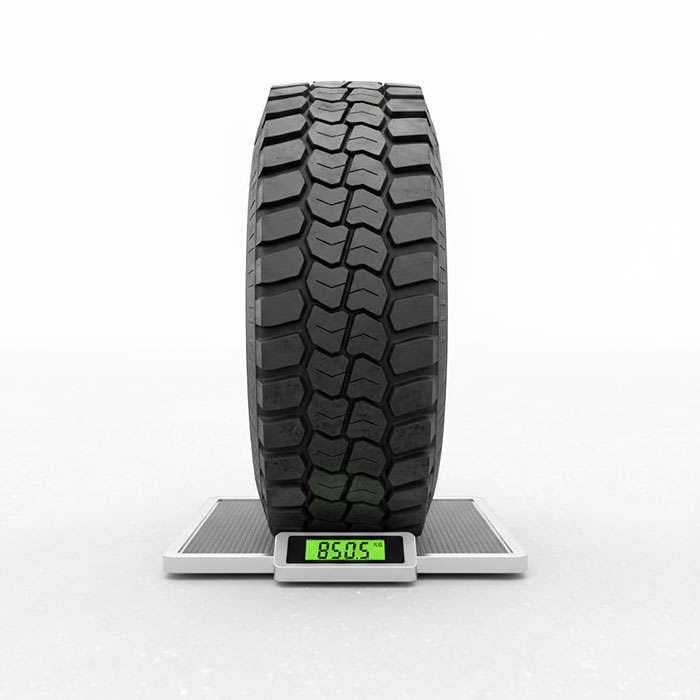
Getting accurate tire weight measurements requires the right approach and equipment. Here are proven methods for weighing tires and understanding weight specifications.
Professional corner scales deliver the most precise readings down to fractions of an ounce. These scales are what tire shops and performance enthusiasts use for exact measurements. A quality bathroom scale works for rough estimates if it can handle at least 50 pounds accurately. For home measurements, weigh yourself holding the wheel, then subtract your body weight to determine the tire-wheel combination weight.
Most tire manufacturers list weight specifications on their websites. Find the product number or DOT serial number on your tire's sidewall—look for "DOT" followed by 13 characters. This identifier gives you access to precise weight specifications without needing to physically weigh the tire.
Understanding the difference between tire weight and total wheel assembly weight matters for performance calculations. Passenger car tires typically weigh 15-25 pounds, while rims add another 20-30 pounds, bringing total wheel weight to approximately 35-55 pounds. Performance modifications and fuel economy calculations depend on knowing both measurements.
Air pressure has minimal impact on tire weight. An inflated tire technically weighs more than a deflated one because air has mass, but the difference is negligible—only detectable with highly sensitive laboratory equipment. For practical purposes, air pressure doesn't change your tire's weight.
When you need new tires with optimal weight characteristics, we carry the best selection of tires at the lowest prices to help you find the perfect balance of performance and efficiency.
Tire weight affects far more than most drivers realize. Passenger car tires weigh 15-25 pounds, while truck and SUV tires range from 45-100 pounds. These differences directly impact your vehicle's fuel economy, handling, and braking performance.
When shopping for tires, weight deserves consideration alongside price and tread life. Heavier tires reduce fuel efficiency and increase braking distances. Lighter tires improve acceleration and handling response, allowing your suspension to work more effectively over road imperfections.
The construction factors we've covered—size, materials, and tread design—all contribute to a tire's final weight. Understanding these relationships helps explain why different tire types perform differently and why weight matters for your specific driving needs.
Smart tire selection balances weight with durability requirements. A 10-pound difference per tire can meaningfully affect your vehicle's performance, especially in city driving with frequent stops and starts.
At Performance Plus Tire, we understand that tire weight is just one factor in finding the perfect match for your vehicle. Our expert team can guide you through the selection process, helping you balance weight, performance, and value to enhance your driving experience. Find the best selection of tires at Performance Plus Tire, where we combine expertise with competitive pricing to help you make the right choice for your vehicle.
Understanding tire weight is crucial for making informed decisions about vehicle performance, fuel efficiency, and overall driving experience.
• Passenger car tires weigh 15-25 pounds, while SUV/truck tires range 45-100 pounds - size and vehicle type dramatically impact weight
• Heavier tires reduce fuel economy by 1-2% and decrease braking performance by 1% per 10 lbs - weight directly affects efficiency and safety
• Tire weight comes from size, materials (rubber, steel, fabric), and tread depth - wider tires and aggressive treads add significant mass
• Use digital scales or manufacturer specs to measure accurately - bathroom scales work for rough estimates when holding the tire
• Air pressure doesn't meaningfully affect tire weight - the difference is negligible for practical purposes
When shopping for new tires, consider weight alongside price and durability. Lighter tires improve acceleration, handling response, and fuel economy, while heavier tires typically offer greater load capacity and durability for trucks and SUVs.
An average passenger car tire typically weighs between 20 to 25 pounds. However, the weight can vary depending on the tire size and type of vehicle. For example, SUV and light truck tires are generally heavier, weighing between 45 to 100 pounds.
Yes, tire weight significantly impacts fuel efficiency. Heavier tires increase rolling resistance, requiring more energy to maintain speed. The automotive industry estimates that a 10% reduction in tire rolling resistance can result in a 1-2% improvement in fuel economy.
Tire weight plays a crucial role in vehicle handling. Heavier tires can decrease brake performance and affect handling responsiveness. Lighter wheels allow the suspension to react more quickly to road imperfections, maintaining better tire contact with the road surface.
Several factors affect a tire's weight, including its size, width, material composition, and tread design. Larger and wider tires generally weigh more. The tire's construction, which includes rubber compounds, steel belts, and fabric layers, also contributes to its overall weight.
To measure tire weight accurately, you can use digital scales designed for automotive use. For a rough estimate, a bathroom scale capable of handling at least 50 pounds can suffice. Alternatively, you can check the manufacturer's specifications for your specific tire model, which often provide weight information.